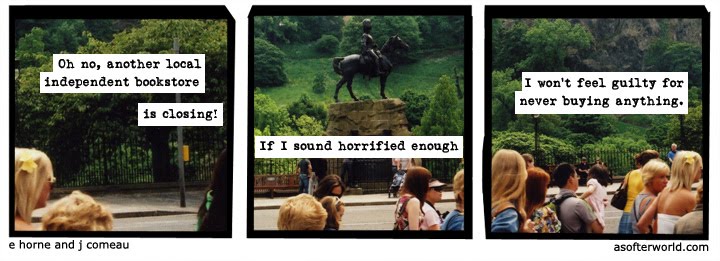 The Amaranth Enchantment by Julie Berry
The Amaranth Enchantment by Julie BerryHardcover, 9781599903347, $16.99
The second book in the exciting "Procrastination Reviews" series, I picked this one up off the shelf when I was searching for an appropriate book to send to the 14/15 year-old girl in the Odyssey Bookshop's Gift of Reading Program. This is a program where people sign up a child in their life to receive a book that has been hand-picked for them. I do the hand picking. This is one of my favorite, and one of the most challenging, aspects of my job. I have 20 children each month whose reading history I review, personal preferences I review, and then I make an age-appropriate, genre-appropriate book choice for them. Occasionally, I throw something different into the mix; reading too much of the same thing isn't good for anyone. This book can be exhibit A in my case - it's hardly my usual "for myself" reading, but it was entertaining nonetheless. Sort of like a teenage version of a Harlequin romance novel, only without any of the sex or violence.
Lucinda Chapdelaine used to be the only child in a wealthy family that was close to the king. Orphaned by a carriage accident that killed her parents on their way home from a ball, Lucinda has grown up in her uncle's jewelry shop, hated and made to work as a servant by her step-aunt. Lucinda doesn't remember much of her life before the shop, though the grief of her parents' death is still with her. Then, in one day, a beautiful woman visits the shop, an enchanted stone makes its way into Lucinda's care, and Lucinda meets Prince Gregor for the first time since childhood. Soon Lucinda is off on an adventure involving a thief named Peter, an immortal woman named Beryl, the Amaranth Witch, and the truth behind her parents' death.
It turns out the enchanted stone holds Beryl's soul and someone is out to steal it in order to rule the world. Lucinda is drawn to the stone, and so tries to keep it safe, only to have it stolen by Peter, a street thief, who is unaware of its true value. Peter sells it to Prince Gregor, who is looking for the perfect betrothal gift for the Princess he has never met, but who is soon to be his bride. Lucinda makes a deal with Beryl - in return for getting back her soul, Beryl will restore her parents' lands to Lucinda, making her a woman of wealth and property again. On her quest for the stone, Luncinda is caught as a thief, meets her parents' murderer, is almost hanged but manages to escapes, dances several dances with Prince Gregor (is she falling in love?), gets saved more than once by her trusty goat sidekick she calls Dog, and unveils more than one person's true identity.
(See what I mean about the Harlequin romance novel plot-line? Throw some duels and hot sex in there and you've got yourself a whole different type of book contract.) It all works out in the end, and the right people marry their true loves without any awkwardness or bruised feelings. A quick read, the book is plot heavy with fairly little character development. Perfect breezy book for a teen summer read.





















